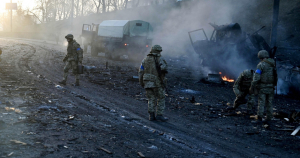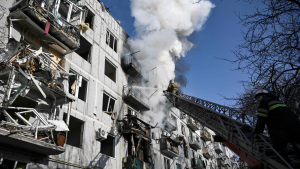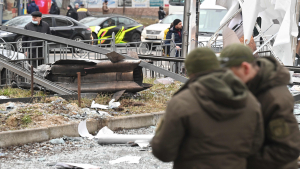
Russian economy reels amid Ukraine invasion, sanctions
Russia’s invasion of Ukraine has triggered political unrest and economic pain in Russia. And the country is being isolated by Western sanctions. After four days of fighting in Ukraine, we look at the major political and economic fallout for Russia.

Reaction to war
Publicly, there have been almost no dissenting voices raised against the military operation in Ukraine among the Russian political and business elite, which seems to be acting in lockstep with the president. In a televised meeting Monday of the powerful Security Council, several senior members seemed openly fearful; apparently hesitant and nervous in front of Putin.
The few exceptions include billionaires Mikhail Fridman, Russia’s 11th wealthiest person, and Oleg Deripaska, the country’s 38th wealthiest, who both offered criticism of the invasion Sunday. Fridman, who was born in Ukraine and spends much of his time in London, said in a letter to staff that “war can never be the answer”. More ambiguously, Deripaska wrote on his Telegram channel that “peace is very important”. Yelizaveta Peskova, the daughter of presidential press spokesperson Dmitry Peskov who studied at a university in France, posted a ‘no to war’ message on her Instagram on Friday, although it was quickly deleted.
Dissent has been far more widespread in urban, cultural circles, with many expressions of anger on social media. An online petition against the war was signed by almost a million people, and dozens of professional groups released statements in protest: for example, over 5,000 architects signed a statement condemning the war, as did more than 6,000 doctors and medical staff, and over 500 heads of charities and non-governmental organizations.
Tens of thousands of Russians have taken part in rolling anti-war protests in cities and towns across the country. A total of almost 6,000 people were arrested at such demonstrations in four days since the beginning of the invasion, according to protest-monitoring group OVD-Info (which is designated a ‘foreign agent’ by the Russian authorities).
Economic impact
Stock markets felt the brunt of the initial shock. When Putin signed a decree about the formal recognition of the rebel statelets in Eastern Ukraine on Monday, the Moscow Exchange dropped 10.5 percent and the dollar-dominated RTS fell 13.2 percent. And when the Russian invasion began three days later, there was a collapse: the Moscow Exchange crashed 33.3 percent and the RTS fell 38.3 percent. This was the biggest one-day fall on the Russian stock market since their inception, and was similar in scale to some of the biggest falls ever recorded on stock markets worldwide.
The ruble also took a pummeling, reaching almost 90 against the U.S. dollar Thursday, a record low and all the shocking since the price of oil, Russia’s main export, is trending upward and close to $100 a barrel. The currency pared some of its losses the following day, and was trading at about 83 rubles to the U.S. dollar Friday. However, it looked set for more major falls. Expectations grew over the weekend that a run on the ruble was likely when markets opened Monday — and many Russians people spent hours queuing for increasingly hard-to-find foreign currency.
For Russian consumers, it is U.S. sanctions on Russian banks that had the most immediate impact. Those who used sanctioned banks are now no longer able to pay with their bank cards abroad, they cannot access international online platforms, nor use Apple Pay and Google Pay.
Within hours of the invasion, Russia’s Central Bank began taking measures to stabilize stock markets and prop up the currency. And the following day it began helping Russian banks. Gold and currency reserves held by the National Wealth Fund were being used to support the ruble and ensure price stability, Finance Minister Anton Siluanov told an emergency government meeting Friday that was devoted to dealing with the consequences of sanctions.
On Sunday night it became evident that the measures are going to be truly extraordinary. A leaked document revealed that the Central Bank has ordered a block on foreign clients’ bids to sell Russian securities. If confirmed, this move would cut off the Russian stock market from the world indefinitely.

Wartime censorship
Coverage of the military action in Ukraine on Russian state-owned TV channels — how a majority of Russians get their news — has downplayed the scale and intensity of the fighting, stressing instead that the military intervention protecting the rebel-held areas of Eastern Ukraine. There were also claims that Russian soldiers were being welcomed as liberators — and little mention of battles raging outside Kyiv and Ukraine’s second city, Kharkiv.
At the same time, the Russian authorities have been ramping up pressure on independent media outlets and widely-used social media platforms. Media watchdog Roskomnadzor announced Friday that it would slow the operation of Facebook in response to restrictions imposed by the social network on the accounts of state-owned TV station Zvezda, news agency RIA Novosti and websites Lenta.ru and Gazeta.ru. Over the weekend, there were widespread reports of outages for Russian users on Facebook, Twitter and Instagram.
In addition, Roskomnadzor said Thursday that media outlets covering the war should only use information from official Russian sources. This was followed Saturday by a warning to ten media outlets that they would be blocked unless they stopped using the terms “invasion”, “attack”, or “declaration of war” to describe events in Ukraine — instead, Roskomnadzor said, it should be described as a “special military operation”. The outlets that received the warning included Meduza, TV station Dozhd, Mediazona, The New Times and Ekho Moskvy (Mediazona and Dozhd are designated ‘foreign agents’ by the Russian authorities).
Sanctions
A package of joint sanctions were unveiled Saturday night in a joint statement from the EU, U.S. and Canada that pledged to remove some Russian banks from international payments system SWIFT, put restrictions on the Russian Central Bank, and ban the practice whereby by wealthy Russians can buy citizenship of European countries (so-called ‘golden passports’). Sanctions against the Central Bank appear to be the most significant: they will freeze more than half of Russia’s financial reserves which total at $643 billion.
Other country-specific sanctions include:
United States:
- Symbolic sanctions on Putin, Foreign Minister Sergei Lavrov and Defense Minister Sergei Shoigu (similar sanctions were imposed by the European Union and the United Kingdom)
- Russian banks, including state-owned VTB, Otkritie, Sovkombank and Novikombank, were targeted by full-spectrum sanctions: a freeze on their assets, ban on operations, and punishments for U.S. and European organizations that work with them. Russia’s largest bank, state-owned Sberbank, was hit with less comprehensive sanctions: all correspondent accounts with Sberbank in the U.S. will need to be shut within 30 days (this will stop Sberbank from dealing in dollars). At the same time, the U.S. banned Russia’s largest privately-owned bank, Alfa Bank, from issuing shares.
- A ban on the export of high-tech goods to Russia. In short, this means any would-be exporters of high-tech goods — like computers, electronics, communications equipment or equipment for the aerospace industry — will need to obtain an official license. The only exception is communication equipment for the consumer sector: i.e. there will be no ‘iPhone ban’.
- Eleven Russian companies — including state-owned gas giant Gazprom — were banned from U.S. capital markets.
European Union:
- All European Union airspace will be closed to Russian aircraft.
- State-owned television channel RT and news agency Sputnik will be banned from operating.
- A €100,000 limit on the size of bank deposits that can be held by Russian individuals and organizations.
- Bans on the export to Russia of equipment for the oil and gas industry, the aerospace sector, and defense companies.
- EU-produced aircraft will no longer be leased to Russian airlines. This restriction may affect existing contracts — meaning planes must be returned within 30 days, according to Russian newspaper Kommersant. Two-thirds of the fleet of national carrier Aeroflot is made up of leased aircraft, as well as two-thirds of the fleet of top airline S7 and the entire fleet of Urals Airline.
- Finally, the Council of Europe has suspended all representatives of Russia from participation in the pan-European rights body’s Committee of Ministers and its parliament. However, Russia remains a formal member of the body.
United Kingdom:
- On the day of the invasion, the U.K. announced sanctions on major Russian companies including state-owned bank VTB, national carrier Aeroflot and defense conglomeration Rostec.
- Like the EU, the U.K. announced a limit on the amount of money that Russian citizens can deposit with U.K. banks — in this case, £50,000 ($66,800).
- A moratorium on the export of high-tech equipment to Russia, sanctioned the children of high-ranking officials (including those of oil executive and Putin confidante Igor Sechin), as well as banning a series of major Russian companies from raising debt on U.K. markets.
- A ban on Russian aircraft from entering U.K. airspace.

How far will Western sanctions go?
The nature of future rounds of sanctions will depend on the length and intensity of the fighting in Ukraine, and whether Ukraine survives as a functioning state, according Ivan Timofeev, an expert on sanctions at the Russian International Affairs Council. Either way, more sanctions are all-but inevitable. “There are two mutually-exclusive scenarios: either the war drags on, or it ends quickly and leads to regime change in Ukraine. Either scenario will lead to new sanctions,” Timofeev said.
There is plenty of scope for new restrictions, according to Timofeev. They could include: increasing the number of targeted banks; reducing the ability of financial institutions to open correspondent accounts in the U.S.; increasing the number of countries who will not issue visas to Russians; ramping up sanctions on oil and gas companies working in Russia; and imposing new sanctions on the infrastructure, transport or telecommunications sectors.
What will happen to the Russian economy?
GDP. The Russian economy’s long-term potential for annual growth is now less than 1.5 percent, according to Sofiya Donets, the chief economist at investment bank Renaissance Capital. She added that the economy will shrink this year — despite high oil prices.
Ruble. “80 rubles to the U.S. dollar and higher is our new reality,” said Donets. According to her forecast, a U.S. dollar will be worth about 85 rubles this year. However, Donets spoke prior to the announcement of Western restrictions on SWIFT and the Russian Central Bank, which could put even greater, short-term pressure on the ruble.
Income. “Russian incomes will be eaten up by inflation, uncertainty, and a lack of investment,” said Donets. In the medium-term, real incomes will stagnate or fall.
Inflation. An inflation shock triggered by a falling ruble is inevitable. For the moment, Donets said inflation this year could reach 7 percent. But she admitted that “the situation is worse than even our most pessimistic worst-case scenarios.”



